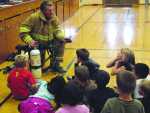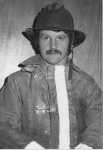A lifetime of service

Even as a young child, Phil Gridley dreamed of being a firefighter. He was transfixed each time the engines rolled past his grandparent's place in California. Sometimes, he'd roll out of bed at 2 or 3 o'clock in the morning if he heard the sirens as the trucks left the nearby station.
It was a childhood obsession that led him to a 35-year career with the Mountain Home Fire Department. But in a few short days, those childhood dreams will be memories as Gridley steps down as the head of the team that he considers family.
Looking back on the events that changed his life, the fire chief remembers the long road he took to join the department here. Following a tour of duty in Vietnam, he returned to Mountain Home in 1974 looking for career options. While playing baseball one day with the local league, he received some words of encouragement by Dean Wilson, a captain with the city fire department who urged him to submit his application.

While it sometimes takes a few weeks for people to get a response to any job application, it took nearly three years for the department to accept him.
But persistence paid off, and in January 1977, his dream of becoming a firefighter was now a reality. From there, he faced the arduous challenge of learning the trade that would remain the focus of his life for the next 35 years. Looking back, he still remembers his first emergency call.
"Everyone will always remember their first fire," Gridley said. But in his case, it was far from a major blaze -- a dog house caught fire.
His second fire, however, was far more challenging. It involved a blaze at the Edgemeade facility that's now home to the Idaho National Guard armory. One of the Quonset huts was on fire, and Gridley was immediately pressed into service by one of the department's veteran firefighters. The orders were very clear: Put on an airpack and prepare to go inside. For the rookie fireman, he was going to experience a true "baptism by fire."
"I was getting trained as I was getting ready to go in and fight the fire, and I was scared to death because I had no idea what to expect," he said. However, the teachings of that veteran not only got Gridley quickly up to speed, but it helped him quickly adjust to the rigors of fire fighting.
Contrary to what people see on television or the movie theater, being in an actual building fire is far more challenging and dangerous that people may expect, according to Gridley. Before the advant of today's rescue technology, firefighters were literally feeling their way through the blaze since thick clouds of smoke would cut visibility to zero. At best, people might see a glow from burning furniture through the thick, choking clouds of billowing smoke.
"In a real good working structure fire, we were taught to grab each other -- we were in constant contact because you couldn't see in front of you, he said."
For Gridley, it was the thrill of entering a burning building that captivated him during his first years with the department.
"I wanted to be the guy carrying the nozzle... I wanted to be the guy making the entries" into the burning buildings, he said. It was the ultimate adrenalin rush.
On average, the city and rural fire departments respond to 150 fires a year. Many of them are false alarms. Others are small-scale fires that are quick to extinguish.
The rest are ones that Gridley and veterans of the department continue to talk about today. Among them was the fire in the gymnasium at Mountain Home High School back in the early 1980s.
"I was leading a crew into the gym, and the black smoke was from the ceiling all the way to the floor -- heavy black smoke," he said. "All we could see were a few sparkles of flame."
It was one of the rare instances where everything went exactly to plan, he added. Once the crew ventilated the roof, they saw that the fire was limited to the ceiling and part of the floor and not much else.
Others like the Gearjammer fire, the former truck stop and restaurant located in what's now the Pilot service station, represent the many close calls these firefighters have dealt with over the years.
"We had sent six people into that building down two different locations," Gridley said. "As they were going in, we had two officers on the back of the building. Because of their training, they noticed signs that we had to pull everybody back immediately. Instantaneously, they both said get them out of there. We hit the horns and got everybody out. And that building exploded as they guys were leaving the building. We were within seconds of losing six fire fighters."
The building was a total loss, but those six firefighters are still with the department today, he said.
However, the one blaze that continues to haunt him was a house fire that happened on New Year's Eve several years ago off American Legion Boulevard.
"There were three kids at home, and their grandmother lived next door," he said. The blaze started in the fireplace, and all three children were able to escape and run to their grandmother's house. However, the youngest, who was just 11 years old, then turned around and ran back into the burning home. Perhaps she ran in to save a family pet. Maybe she was hoping to retrieve a beloved toy.
She never made it out.
Today, this fire still hits Gridley hard since he was good friends with the family. However, he's used this experience as a teaching point when he would talks to local school children as part of his fire safety briefings every year.
"If there's anything I've enjoyed more in my years of fire service is being able to go to the schools and talk to our young kids," he said. After those briefings, those same students will walk up to him and want to talk. Some still remember those briefings 20 years later.
"If there's anything that I'm going to miss in the fire department, that's going to be the big thing I'm going to miss," he said.
In addition, he admits he'll miss the close bonds he shared with the 33 men and women of this department.
"Fire service is like a family, and like family you have your ups and downs," he said. "We have our good days and those days where we argue with each other. But when things really get tough, we all come together."
